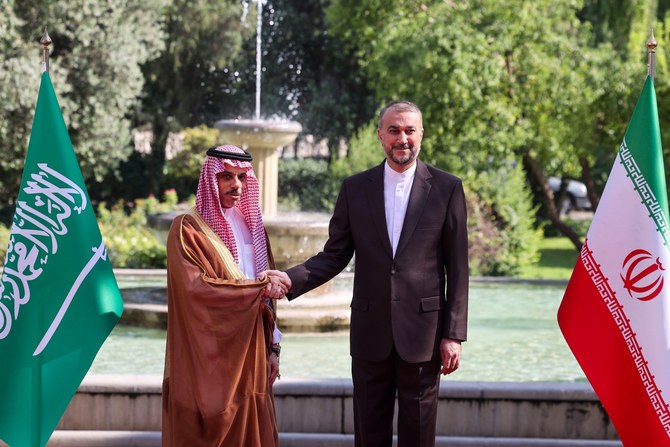
Over the past few days, Iranian media outlets have reported that Iran has invited Saudi Arabia to join a joint naval alliance that is in the pipeline. In addition to Iran, the alliance will include Gulf states like Saudi Arabia — with the aim of protecting the Middle Eastern nations’ maritime security and outlining guarantees for the safety of international navigation through new security arrangements.
The latter are likely to chiefly rely on the armies of the anticipated alliance’s member states rather than extraregional military alliances stationed in the region’s security sphere. Iran has reiterated its efforts to forge a trilateral maritime alliance in partnership with Russia and China. This invitation to the Kingdom comes against the backdrop of the two regional heavyweights’ moving ahead with the restoration of diplomatic relations under a rapport deal signed in Beijing.
It is natural that the regional powerhouses exerting influence over regional issues and desiring to protect the region’s security and stability believe in the effectiveness of collective efforts to protect the Middle Eastern security sphere. This will proceed uninterrupted as long as the countries calling for such efforts respect the principles of national sovereignty, unity, territorial integrity and good neighborliness. This is in addition to the principles of noninterference in the internal affairs of sovereign states and settling of nonextensive disputes that have been unresolved for decades in accordance with UN Security Council resolutions, as well as the signed settlement agreements.
Moreover, the anticipated alliance’s member countries should abandon the destructive projects that raise concerns and suspicions about the intentions behind their involvement in collective security efforts. When all this happens, regional security arrangements could be adopted by the region’s countries.
The anticipated alliance’s member countries should abandon the destructive projects that raise concerns and suspicions
Dr. Mohammed Al-Sulami
The implementation of this equation and the new security arrangements on the ground is obstructed by the consequences of the decades-long crisis of confidence between several countries of the anticipated alliance. This crisis has been created by positions and behaviors that have undermined regional peace and security. This has, in turn, inflamed disputes and exacerbated tensions in the Middle East, thereby fueling more rifts and exhausting some nation states, causing Saudi Arabia and Iran — two regional heavyweights exerting massive influence over regional issues — to be far apart, thus further complicating the crisis between them. However, this crisis has started to subside, with both countries opting to proceed with confidence-building measures since the signing of the rapport deal under which they have restored diplomatic ties.
Iran is aware of the consequences of breaching the terms of the agreement signed with Saudi Arabia under the patronage of China. The Iranian supreme leader ordered the Islamic Republic of Iran Broadcasting to stop any negative coverage, disparaging comments and criticisms of the Kingdom. Nonetheless, following the agreement, some negative Iranian media content about Saudi Arabia was tracked, which constituted a breach of the principles of noninterference in the internal affairs of countries and the protection of their sovereignty. The Iranian media corporation quickly deleted this content after realizing how far it could potentially impact the measures taken at this stage. In recent weeks, it was noticed that the Iranian media outlets had reverted to their old rhetoric, heaping criticisms and insults on the Kingdom in newspapers and news agencies affiliated with the Iranian regime, such as the Tasnim, Fars and Mehr news agencies.
The resumption of criticisms of Saudi Arabia does a disservice to the confidence-building measures
Dr. Mohammed Al-Sulami
In fact, the resumption of criticisms of Saudi Arabia does a disservice to the confidence-building measures, as well as the dissipation of the Kingdom’s misgivings about Iran’s intentions and the orientation of its foreign relations. Such rhetoric will impact the Kingdom’s desire to forge further partnerships and engage in future cooperation with Iran in the various security and commercial fields.
Saudi Arabia is moving ahead with the confidence-building measures, starting with the procedures formalizing the resumption of diplomatic relations, such as King Salman’s invitation to Iranian President Ebrahim Raisi to visit the Kingdom and the visit by the Saudi foreign minister to the Iranian capital Tehran, which will be followed by the reopening of embassies — a step that is expected to occur in the coming days. All these measures are taken out of the Kingdom’s keenness to enhance relations and look to the future with huge prospects in a way that mutually benefits the two nations.
In conclusion, the continuation of interference in the internal affairs of other countries — banned not only under the deal signed in Beijing but also under all UN resolutions — runs counter to the agreement’s provisions and the new guidelines set out by the Iranian supreme leader for Iranian foreign policy over the past days. This is in addition to the reiteration of former Foreign Minister Javad Zarif in a Twitter post that there are no zero-sum games in foreign policy, meaning that all parties can make gains and have their interests maintained, rather than the interests of only a certain party. Major opportunities and joint interests that require more steps to build and sustain, rather than diminish and complicate confidence, await the two countries.
Dr. Mohammed Al-Sulami is president of the International Institute for Iranian Studies (Rasanah). Twitter: @mohalsulami







